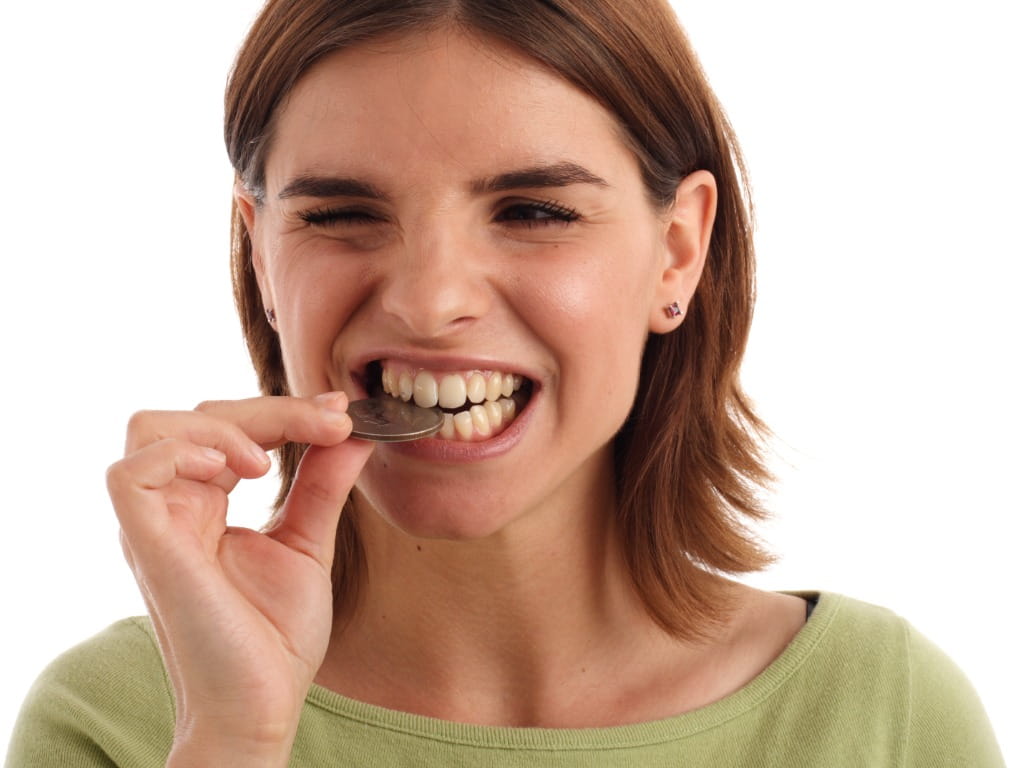Swallowed a coin? Here’s what you need to know.

The Bottom Line
Swallowed coins often pass through the gut on their own, but sometimes they get stuck in the esophagus and cause serious tissue damage. Swallowed coins can lodge in the windpipe (trachea) and cause choking. After a coin is swallowed, an x-ray is often performed to determine the location of the coin and help guide treatment recommendations.

What happens if you swallow a coin?
Coins are one the most common non-food items swallowed by adults and children. Swallowed coins may pass through the stomach and intestines, and exit the body in the feces. In some cases, coins can get stuck in the trachea (the windpipe) instead of entering the esophagus (the foodpipe). An x-ray can help identify the location of a swallowed coin. It can also confirm the object was indeed a coin and not a button battery which young children may describe as a coin. Ingesting a button battery can lead to life-threatening complications. If a coin gets stuck in the trachea or does not pass from the esophagus into the stomach within a short period of time, it must be removed using specialized medical equipment.
What happens if a child swallows a coin?
At least one-fourth of children who swallow a coin will pass the coin through the esophagus to the stomach, then to the intestines. The coin will then travel through the GI tract and exit the body in the feces. The child’s age, as well as the size of the coin, can sometimes help determine the likelihood of coin passage. In one study, coins larger than 1 inch in diameter, such as quarters, were more likely to get stuck and require removal than smaller coins like pennies and nickels. Younger children, especially those less than 5 years of age, are also more likely to require coin removal than older children.
Can swallowing a coin kill you?
Unless choking occurs, swallowing a single coin is unlikely to result in death. Coins that are removed from the esophagus within 24 hours of swallowing are not likely to cause permanent tissue damage, but serious internal injuries can occur if coins remain in the esophagus for longer periods of time. Consumption of large numbers of coins that contain zinc, such as pennies that were created after the early 1980’s, can result in zinc toxicity. When zinc-containing coins are swallowed, the acidic fluid in the stomach can cause zinc to leach from the coins. This can cause stomach pains, diarrhea, vomiting, and other symptoms of zinc poisoning. In severe cases of zinc toxicity, death can occur.
How long should a swallowed coin stay in the stomach?
Once a coin passes from the esophagus into the stomach, it normally will be excreted in the feces within a few weeks. Repeat x-rays can be performed every 1-2 weeks to monitor the movement of a swallowed coin through the intestines, and close inspection of bowel movements may reveal the presence of a coin that has exited the body. If the swallowed coin does not pass in the feces or if the affected individual develops pain or other worrisome symptoms, a medical procedure may be performed to remove the coin from the gut.
Does a swallowed coin always need to be removed?
The management of swallowed coins, especially in children, is controversial. Individuals who experience significant symptoms, including drooling, difficulty swallowing, or breathing problems) after swallowing coins generally require a medical procedure to remove the coin or coins from the body. Since swallowed coins may pass naturally through the intestinal system in many people, those who remain asymptomatic after swallowing a coin may be referred to a doctor for a removal procedure depending on the location of the coin, or may be monitored closely for the development of concerning symptoms that may indicate that a removal procedure is necessary. In one study of healthy children who swallowed coins that became stuck in the esophagus, outcomes and complications were similar in children who underwent a removal procedure compared to those who underwent observation of 8-16 hours in a hospital setting. In some cases, home observation may be appropriate, but affected individuals must still be monitored closely for the development of worrisome signs or symptoms.
How do you remove a swallowed coin?
Swallowed coins that remain in the esophagus or cause significant symptoms can be removed by several methods, including insertion of a rigid or flexible tube into the esophagus to remove the coin or push it into the stomach, where it is more likely to pass through the gut naturally. These procedures are performed by a doctor in a hospital setting, and should not be attempted at home. The success rate for the removal procedure is high, and complications are rare.
How long does it take to pass a swallowed coin?
Because the level of gut activity varies among individuals, it may take anywhere from a few days to a month for a swallowed coin to pass through the gut and out of the body through the feces. People who have underlying gastrointestinal disease, or those who have undergone surgical procedures on the stomach or intestines, may experience slower passage of swallowed coins than healthy individuals. A high-fiber diet may encourage passage of the coin.
What should you do if your child swallows a coin?
If a coin is swallowed, get guidance from Poison Control immediately. Help from Poison Control is available at www.poison.org and by phone at 1-800-222-1222. Both options are free, confidential, and available 24 hours a day.
Kelly Johnson-Arbor, MD
Medical Toxicologist
Poison Control Media Information
Did you find this page helpful? If so, we need your support. Poison Control is in constant competition with misinformation online. Links to www.poison.org or our webPOISONCONTROL triage tool from other websites and blogs help internet searchers quickly find accurate information and Poison Control’s contact information in an emergency. If you use the content from this page, please provide attribution via a link back to this page, www.poison.org, or https://triage.webpoisoncontrol.org/#!/exclusions. By doing so, you could save a life. Thank you!
Click here for Poison Control media contact information.
Suggested page citation (APA):
Johnson-Arbor, K. (n.d.). Swallowed a coin? Here’s what you need to know. Poison Control. https://www.poison.org/articles/swallowed-a-coin
Poisoned?
Call 1-800-222-1222 or
Prevention Tips
- Keep quarters, nickels, and other spare change out of the reach of young children.
- Remind older children to not put coins in their mouths or swallow them on a dare.
- To keep bowels moving normally, drink plenty of fluid and eat foods that are rich in fiber.
This Really Happened
Case 1: A 5-year-old child swallowed a coin at school. Although the child had no complaints of pain or difficulty swallowing, the school nurse called Poison Control, and was advised to have the child go to the Emergency Department for an x-ray to determine the location of the coin. At the Emergency Department, the x-ray confirmed that the coin was in the child’s stomach. The child was then discharged home, and the parents were instructed to monitor their child’s stool for passage of the coin.
Case 2: A 55-year-old man was admitted to a hospital due to loss of appetite, stomach pains, and bloody vomiting. An x-ray revealed the presence of multiple round objects in his intestines, and he told medical staff that he had swallowed a large number of coins prior to hospital admission. During a surgical procedure to remove the coins from his gut, a total of 461 coins (including 425 pennies) were extracted from his intestines. He was diagnosed with zinc toxicity and was treated with chelation therapy, but his condition worsened, and he died 20 days after the surgical procedure. At autopsy, esophageal inflammation and intestinal tissue damage were found (from Bennett, et al, 1997).
For More Information
My Toddler Swallowed a Penny—Now What? (Parents)
What to do if your child swallows a penny or other object (Children's Health)
References
Schweich PJ. Management of coin ingestion: any change? Pediatr Emerg Care. 1995 Feb;11(1):37-9.
Poisoned?
Call 1-800-222-1222 or
Prevention Tips
- Keep quarters, nickels, and other spare change out of the reach of young children.
- Remind older children to not put coins in their mouths or swallow them on a dare.
- To keep bowels moving normally, drink plenty of fluid and eat foods that are rich in fiber.
This Really Happened
Case 1: A 5-year-old child swallowed a coin at school. Although the child had no complaints of pain or difficulty swallowing, the school nurse called Poison Control, and was advised to have the child go to the Emergency Department for an x-ray to determine the location of the coin. At the Emergency Department, the x-ray confirmed that the coin was in the child’s stomach. The child was then discharged home, and the parents were instructed to monitor their child’s stool for passage of the coin.
Case 2: A 55-year-old man was admitted to a hospital due to loss of appetite, stomach pains, and bloody vomiting. An x-ray revealed the presence of multiple round objects in his intestines, and he told medical staff that he had swallowed a large number of coins prior to hospital admission. During a surgical procedure to remove the coins from his gut, a total of 461 coins (including 425 pennies) were extracted from his intestines. He was diagnosed with zinc toxicity and was treated with chelation therapy, but his condition worsened, and he died 20 days after the surgical procedure. At autopsy, esophageal inflammation and intestinal tissue damage were found (from Bennett, et al, 1997).
